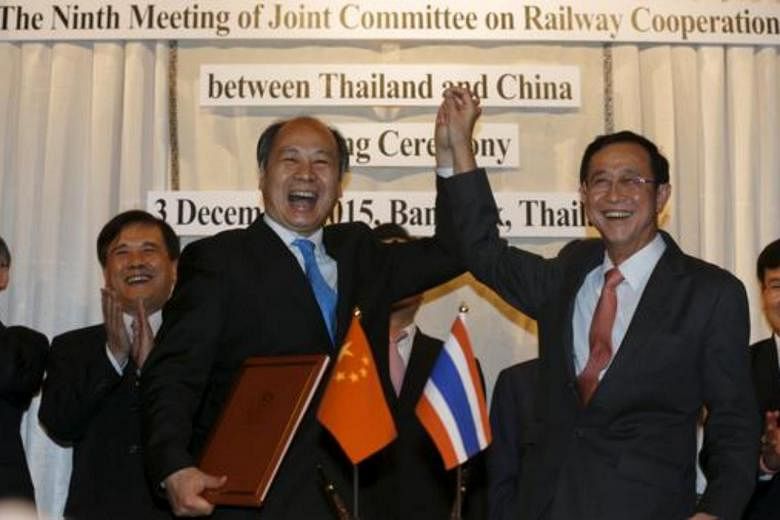In its editorial on 19 June, the paper warns of the perils of forcing through the fraught high-speed railway deal between Thailand and China.
BANGKOK (THE NATION/ASIA NEWS NETWORK)- The government will have to formulate a completely new strategy if the planned high-speed railway is to meet national interests and enhance our own economic development rather than merely serving China's needs.
As it stands, the deal being negotiated with China to build a Bt179-billion (S$7.3 billion), 250-kilometre line linking Bangkok and Nakhon Ratchasima appears to accommodate only China's ambitious Road and Belt Initiative. It has meanwhile set a poor precedent for Thailand's international engagement.
The government blundered at the outset by allowing politics to intrude on infrastructure planning. Stung by criticism from the West and Japan for suppressing democracy, it chose China to build the railway. An agreement was signed to jointly develop the rail transport system in December 2014. Visiting Chinese Premier Li Keqiang made clear Beijing's intentions to dominate such infrastructure development in the region and he wanted the railway deal with Thailand to serve as incentive for our neighbours.
China has been open about its desire to export rail technology to the world, even if in direct competition with other countries. It has a clear strategy for doing so. Thailand, in striving to meet its own domestic needs, has relied more on improvisation, and no one in government has yet been able to explain exactly why we need a high-speed railway, a proposal always shunned previously as being without merit and simply too expensive.
The long-mooted rail project had become politicised even before General Prayut Chan-o-cha staged his coup. Opponents of the Yingluck Shinawatra administration warned that its grand infrastructure plans, including a high-speed train, would sink the country in debt.
The Prayut government initially kept clear of the railway idea, but China's offer to help build it came just as the junta was desperately seeking international recognition. It had been considering a medium-speed railway linking several places, including the Eastern Seaboard. Higher speed was "politically incorrect" until Prayut declared his government's readiness to foot the bill for a fast train built with Chinese technology.
Having signed a preliminary agreement with Beijing, Thailand's hands are now all but tied, leaving little if any choice but to work with China and use its technology, personnel and resources. Negotiations over the past two and a half years have mainly addressed China's terms and conditions. Thai law has been overridden to clear the way forward, in apparent contravention of international norms in business practice.
Prayut and his fellow generals have no experience in international affairs of this nature. They failed to realise that Thailand is legally obligated to meet various international standards.
The government's decision last week to invoke Article 44 of the interim constitution to get the railway scheme moving violates some of those international rules. Overriding Thai law so that procurements can be made and Chinese engineers can serve on the project without work permits might violate the principles of the "most favoured nation" status granted Thailand by the World Trade Organisation.
Where is the transparency Prayut promised on this deal if a coup-imposed privilege has to be used to bring the project about? If this railway is genuinely in the national interest, major revisions are needed in the plans and open international bidding on procurements must be permitted. In doing so, not incidentally, Thailand would be in a position to make the best choices for its future.
The Nation is a member of The Straits Times media partner Asia News Network, an alliance of 22 news media entities.

